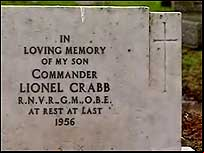Exclusive
story |  | "Our
heroes were our heroes, and we couldn't have a war hero defecting."
Sidney
Knowles. | Buster Crabb
- hero to many or double agent? | |
Buster Crabb - the 'spy' from
the Cold War? 4in5sInside Out follows the remarkable story of war hero Buster
Crabb who disappeared in strange circumstances in 1956. 6wb7 It's one of the
great unsolved Cold War mysteries. We bring to light new evidence which
suggests that Crabb did not die accidentally in the cold waters of Portsmouth
Harbour - as the government claimed. Crabb's former diving partner, Sydney
Knowles, has given his first televised interview to Inside Out. And he suggests
that Crabb may have been murdered on the orders of British intelligence. Headless
frogman 5f3b1oA year after Crabb's disappearance in 1956, the headless remains
of a frogman was found on the South coast of England. Sydney Knowles identified
the body as Crabb's - but told Inside Out he only did so under pressure: "Crabb
had a specific scar on his leg - which he'd got diving near barbed wire. That
body didn't have one."
 | | Sydney
Knowles sheds new light on Crabb's disappearance |
Sydney Knowles
first met Commander Crabb in Gibraltar midway through the Second World War and
became his diving partner or "buddy". Crabb won the George Medal
for his role in removing mines from British ships. "I loved that man,"
says Sydney affectionately, "the whole navy loved him." Cold
war 4t69yAfter the war, Crabb returned to civilian life and was revered as
a war hero. Buster
Crabb | Born Lionel Crabb in 1909 in London.
ed the merchant navy in his youth. During World War II he became an
army gunner. ed the Royal Navy in 1941. In 1942 Crabb was sent to Gibraltar
where he worked in a mine and bomb disposal unit. Received a George Medal for
his work and was promoted to Lieutenant Commander. Became Principal Diving
Officer for Northern Italy in 1943 where his job was removing mines in the ports
of Venice and Livorno. Acquired the nickname "Buster" after Hollywood
actor and swimmer Buster Crabbe. After the war worked in Palestine with
an underwater explosives disposal team. Demobilised in 1947 but returned
to work for the Royal Navy including investigating sunken submarines. In
1955 Crabb investigated the Soviet ship Sverdlov with frogman Sydney Knowles. Disappeared
in 1956 on a MI6 mission to investigate the Soviet cruiser Ordzhonikidze. The
body of a headless frogman was later found off Pilsey Island. Crabb's ex-wife
and girlfriend couldn't identify the body. An open verdict was returned by the
inquest. |
However, there was still the odd diving job. In
1955 Sydney accompanied Crabb on a secret mission to spy on the Russian warship
Sverdlov on
its visit to Portsmouth. But, according to Sydney, Crabb
was finding it hard to find a job. "He was very bitter," says
Sidney. He was also mixing with a pro-Soviet group of people - and they
dragged Sydney along to parties attended by the likes of double agent Anthony
Blunt. "It's either suicide or bloody Russia," Crabb told Sidney. Afraid
Crabb was thinking of defecting, Sydney alerted MI5. He also refused to
dive with Crabb on a second Russian ship, the Ordzhonokidze - which had also come
into Portsmouth Harbour. But he believes Crabb didn't dive alone on his
last fatal mission: "He told me they'd given him a buddy
diver."
This was the dive from which Crabb never returned.
Sydney believes Crabb was murdered: "Our heroes
were our heroes, and we couldn't have a war hero defecting."
Crabb
theories 6m6exOver the years there have been many theories about Crabb's disappearance
including: * Crabb was a double agent involved in espionage
and he had been killed by a secret Soviet underwater weapon. * He was captured
and brainwashed to work for the Soviet Union so he could train their frogman teams. *
Crabb defected and ed the Soviet Navy under the name Lev Lvovich Korablov. *
MI6 asked Crabb to defect so he could become a double agent. * He was murdered
by MI5 - Crabb was known by MI5 to have been thinking of defecting to the USSR.
As a result MI5 created the mission to the Ordzhonikidze so it could murder Crabb
and cover up his death.
Secret papers 243x4rAll the official
papers on Crabb's death were to be kept secret - at first for the usual 30 years,
which was then extended to 100 years.  | | Crabb
- war hero, diver and Cold War spy? |
In 2006, BBC South managed
to use the Freedom of Information Act to get hold of the official report into
Crabb's last mission - which made it clear the intelligence services had been
told not to investigate the Russian ships. Now Inside Out has been able
to review more papers on the case - which show how the inquest into Crabb's death
was orchestrated by intelligence services. Furthermore they indicate that
there were other divers investigating the Ordzhonkidze while she was in Portsmouth
harbour. Links relating to this story: 1o1vrThe BBC is not responsible for the
content of external websites | 
